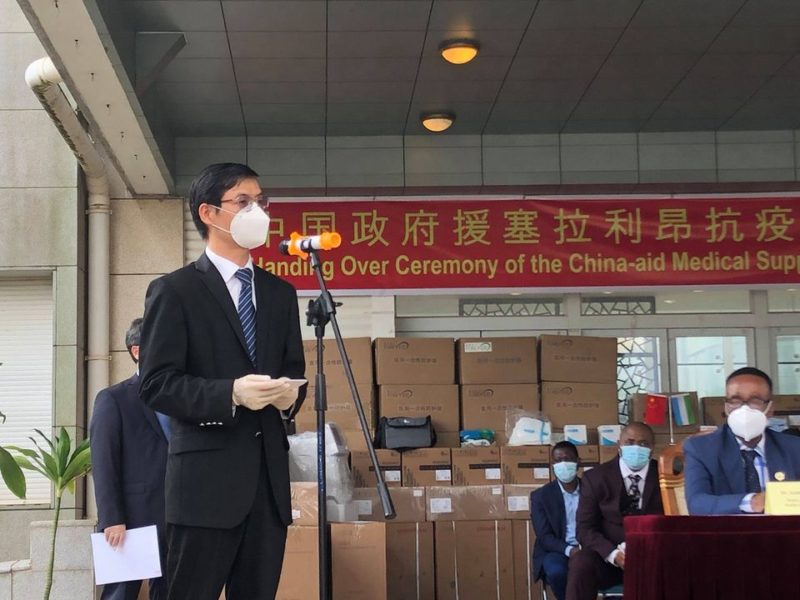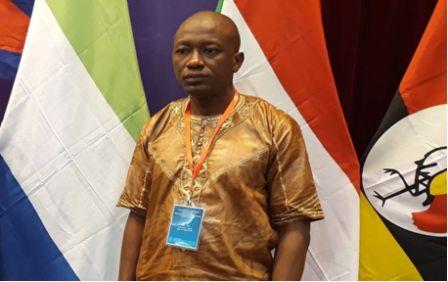Chinese socialization and hospitality … a foreign student’s perspective
This article is a reaction to the rather many stereo-typed assertions about Chinese people and their relationship especially to foreigners. Prior to my arrival in China, the few and tailored information available to us back home about the Chinese people with regards socialization and hospitality towards foreigners was nothing good to write home about. We were made to swallow hook line and sinker that the Chinese environment was very difficult to adapt to and very hostile to foreigners. These perceptions especially on socialization was amplified in such a way that we were left to conclude that there was no acceptable form of socialization in China. The propaganda was that, China does not encourage a free and uninterrupted form of socialization in what ever form simply because of its Government regulated form of every aspect of its citizen’s life. It was unheard of to associate social events like soccer games, night clubs and Disco, social bindings like beach outings, inter racial interactions among the different colours etc. with the Chinese people. On hospitality, it was alleged that the Chinese people do not have patience with other nationals especially blacks. The allegation was that the Chinese are very discriminatory when it comes to relating with other nationals, and that it is difficult to live in the same environment with foreigners. These were all the perceptions I had about China before my arrival.
However, not withstanding these views, what then is the Chinese form of socialization? Socialization by enculturation simply means a complex process by which individuals learn skills, attitudes, values, and patterns of behaviors that enable them to function within a particular culture. These patterns are learned from agencies such as school and home. Socialization enables members of a society to interact with one another and so pass on skills, values, beliefs, knowledge, and modes of behaviour pertaining to that society. In this article, I shall attempt to explain Chinese socialization using various indicators. To start with, the concept of a social life in China is centered on bars, parks, taverns and clubs, where couples, friends meet to talk usually over tea or drink. On arrival in Changchun, one peculiar thing that I noticed is the lack of an entity called a ‘bar’, but of course with lots of Restaurants. Like in my native country Sierra Leone, where we have special structures exclusively for bar services, China proved to be the contrary. The only places I have seen bars is in Beijing, but rather, their Restaurants serve also as bars. Therefore, when the Chinese want to meet, they would daily meet in restaurants instead to socialize. Unlike most African countries, where natives would meet in farm houses/huts, bars, taverns and clubs to socialize, Chinese common meeting spot is usually in restaurants, thus names like Café, Bars, or Pubs are western imports to China. However, because of the quest for great power status in catching up with western powers like the USA, Britain etc, most young Chinese people have started meeting in pubs, if not for anything but to socialize with foreigners thereby enhancing their learning of English. In Changchun, the most common way for people to meet and/or socialize is to go for a lunch and/or dinner date in a restaurant. Eating is a regular habit of the Chinese, thus inviting someone for lunch is considered to be a good way of building relationship in typical Chinese culture, to an extent that if you reject someone’s request to go for lunch/dinner is considered to be rejecting his friendship and sometimes interpreted as been rude or insulting. This is in no way indicative that they Chinese are idle people and always in restaurants eating or drinking. The Chinese can only visit restaurants at lunch time or dinner. Also, dinking alcohol is strongly practiced among the Chinese, but it is interesting to note that high quantity of alcohol is taken during dinner or late in the evening at home or in restaurants or snack shops (known as “Xiao Chi Dian å°åƒåº—” or “Xiao Shi Dian å°é£Ÿåº—”) which sells refreshments, drinks and small snacks. At such public places, the Chinese are always very happy to have foreigners among them. This is because they all want to speak English with you, and they will force out the little knowledge they know about English. Such conversations are always to their advantage though because the end up learning English whiles you continue to be poor in Chinese. There is also a social game they Chinese play on the table called ‘ gambe’. This is like asking every member of the table to propose a toast and when once it is done, you all stand and drink a cup full each without putting it down until it is finished in the cup. In Changchun, there is a popular club called “MAY FLOWER†which is for both foreigners and Chinese natives. In other to accommodate foreign interest, there is another dance room where foreign music of all sorts are played. What is interesting though is that in this foreign dance hall of the same club, you will find more Chinese than we the foreigners. They too want to dance to foreign music such as popular African Akon, Rihanna, etc what more could be more socializing than this?
Moreover, the other area that continues to be criticized as inhibiting socialization especially in my native country is RELIGION. Prior to my arrival in China, I was made to believe that China is a country full of infidels who have no means of and do not allow any means of worship to the Almighty, and who only believe in hard work. Been a Christian, I discovered that Christianity in China is a growing minority religion that comprises Protestants (called 基ç£æ•™ JÄ« dÅ« jià o, or Christ Religion), Catholics (天主教 Tian zhu jiao, or Lord of Heaven Religion), and a small number of Orthodox Christians. Although its lineage in China is not as ancient as beliefs such as Confucianism, Taoism, or Mahayana Buddhism, Christianity has existed in China since at least the seventh century and has gained influence over the past 200 years. The growth of the faith has been particularly significant since the loosening of restrictions on religion by the People’s Republic since the 1970s. However, what I seen challenging is that Religious practices are still often tightly controlled by government authorities. Chinese over age 18 in the PRC are permitted to be involved with officially sanctioned Christian meetings through the “China Christian Council“, “Three-Self Patriotic Movement” or the “Chinese Catholic Patriotic Association. Many Chinese Christians also meet in “unregistered” house church meetings. Reports of sporadic persecution against such Christians in Mainland China have caused concern among outside observers, but there are churches and mosques to pray.
Notwithstanding the Religious form of socialization in China, there is as much political socialization/interaction among the Chinese. I know this particular sector may be interesting to liberal thinkers who continue to criticize China for not opening up to what they would call “participatory governance and/or democracyâ€. Am not a China advocate, but like I have always mentioned in many of my write-ups, the concept of a liberal international order should not be a one fit jacket for all sovereign states on earth especially as we continue to see the limitations of this theory. There is a high level of political socialization in China. The concept of Political socialization concerns the “study of the developmental processes by which people acquire political cognition, attitudes and behaviors†(Davidson, 2009, p. 20). These Agents of Socialization all influence in one degree or another individual’s political opinions: Family, Media, Friends, Teachers, Religion, Race, Gender, Age, Geography, etc. These factors and many others that people are introduced to as they are growing up will affect their political views throughout the rest of their lives. Just some weeks ago, we saw hundreds of Chinese leaders from throughout the length and breathe of China for days, consulting and planning the development of their country. These days of meeting was characterized and climaxed by fanfare, variety shows, and there was high level interaction among China’s policy makers. At least every year, these politicians converge to strategize China’s development. Am pretty sure, my defense is not what many would want to read. They are more interested in political issues such as freedoms, human rights etc. I cannot delve into such because as a foreign student, I have not had the experience of putting up with any of these allegations against China. On the rather hottest and most recent debate are the issue of Google versus China and the banning of facebook in China. Internet (like facebook) is unquestionably a utility for social interaction, but the banning of these widely acceptable facilities and its effects are hardly seen on firstly Chinese natives and to some extent foreigners. In China, social utilities like QQ, badoo, baidu, xunlei, etc could hardly make you miss home. Their services are fast, reliable and easy to operate.
Lastly is about sporting activities as a form of Chinese socialization especially in Changchun. During the first few months of arrival, my nostalgia was so disturbing that I was almost beginning to regret my stay, but honestly my first set of Chinese friends immediately made me get over it, as they took me to the Changchun sport complex, where I started playing major games I had never seen back home. Poor native from the equator was now opportune to do skating on icy floor, bowling, play snow football etc. The word boredom is no more in my vocabulary as everyday am meeting new friends wanting to play with me.
In conclusion therefore, and from my personal experience of life in Changchun, the myth of very poor and negative form of receptiveness and socialization from the Chinese towards foreigners (blacks) isn’t and cannot be true, at least from the Changchun experience. My observations are that the people are very much accommodating because they really want to know us better, and put no restrictions on access to their facilities. Unquestionably, no man is perfect thus, am not categorically saying that it is all rosy out here, but on socializing, especially with foreigners, they are quite accommodating. Am pretty sure, they are aware of their emerging great power status, thus there is a conscious effort to meet such challenges by opening up to the world. You needn’t come to China to know that the Maoist China is different from the China of the 21st century under President Hu.
By Patrick Brima Kapuwa, Jilin University, Changchun City, ChinaStay with Sierra Express Media, for your trusted place in news!
© 2010, https:. All rights reserved.







Wayne
/
I like the article commented by Mr.SEM. And he really told you the truth. With our governor’s changes in 1979 and restrictive policies became lossen, the development of our nation is coming faster and faster until becoming powerful economy in the world like today. the development initially was hard and full of painful. The economic reform has ever paid out a lot of population’s time and spirits (especially for the aged from 35-70 or even higher). Because They are the builders of the civilization and the bearers of the reforming side effects -retortion. So when you see through chinese civilization and modernization today, you should also look behind our destorted past. I like to stay with your people and comment more to your people about our political and development.
9th April 2010